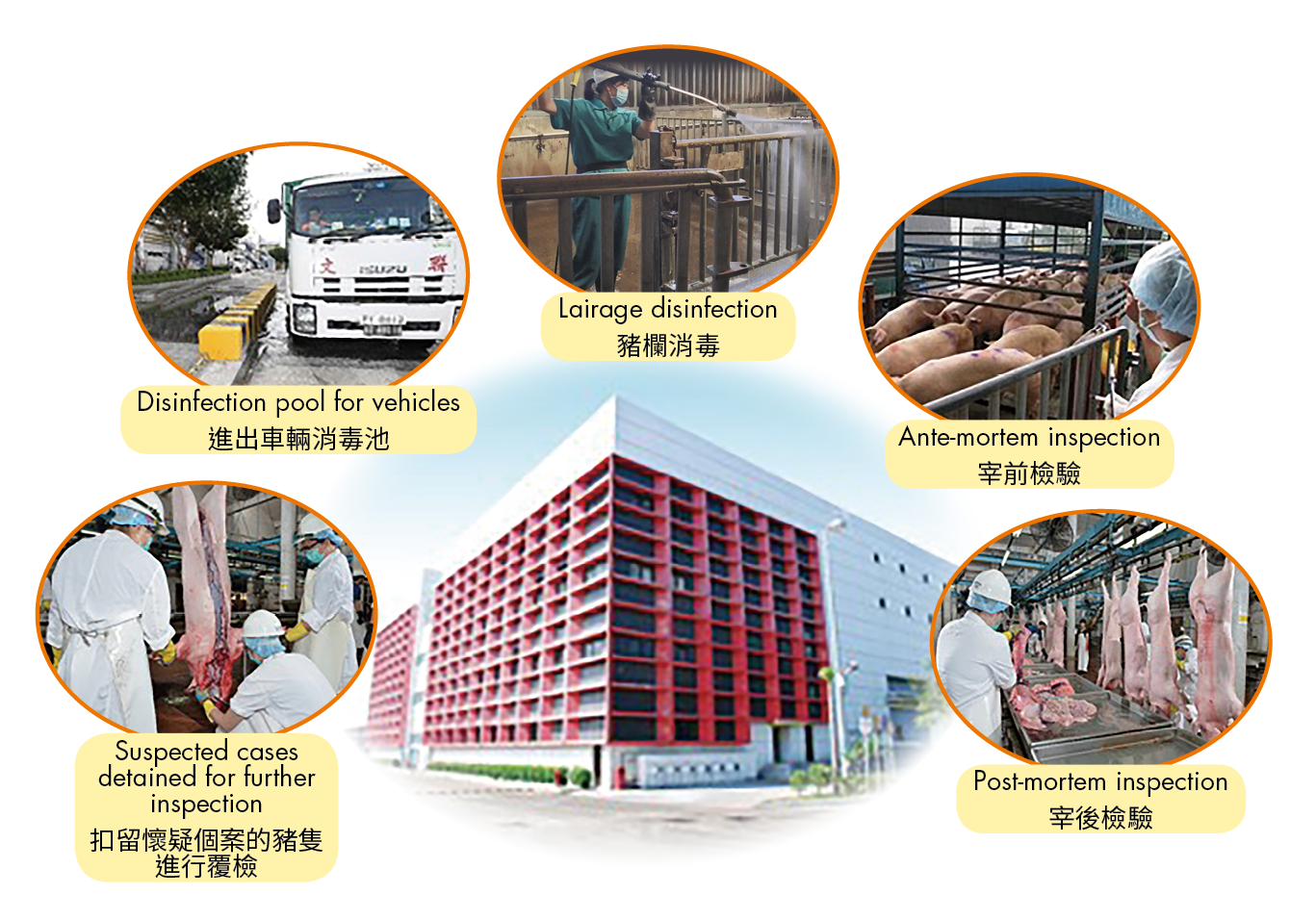
Food Safety Focus (157th Issue, August 2019) – Incident in Focus
Control Measures Enhancement against African Swine Fever
Reported by Dr. Samantha Lee, Veterinary Officer,
Slaughterhouse (Veterinary) Section and Mr. Kenneth Yip, Scientific Officer,
Risk Communication Section, Centre for Food Safety

Control measures in slaughterhouse
African Swine Fever (ASF) is a severe, highly contagious, viral disease affecting pigs, but it does not infect humans and poses no food safety risk. According to World Organisation for Animal Health (OIE), ASF is not a human health threat.
However, ASF can cause mass amount of pig kill within a short period of time, severely impacting on pig rearing farms. Prevention of spreading of ASF in Hong Kong can protect local pig farms. To this end, the Agriculture, Fisheries and Conservation Department (AFCD) implements various preventive measures to minimise the risk of locally reared pigs from infecting ASF. Among others, local pig farmers are required to maintain proper biosecurity including strictly conducting cleansing and disinfection of the farm, controlling the access of vehicles and personnel to farms, and strengthening boundary fencing, etc. Furthermore, the feeding of swill has been prohibited since January 2019 to minimise the risk of contracting ASF through contaminated feed.
Pigs from different local farms and imported from Mainland China are slaughtered in slaughterhouses in Hong Kong for supplying fresh pork to the market. Pig samples collected in Sheung Shui Slaughterhouse (SSSH) were tested positive for ASF virus separately on 10 and 31 May 2019. All the pigs in SSSH were culled and the operation of SSSH was suspended for thorough cleansing and disinfection on the two occasions. Control measures are put in place to prevent the ASF virus from spreading from slaughterhouses to local pig farms and affecting local pigs. With a view to further minimising the risk of ASF infection in local live pigs, control measures have been strengthened.
Animal Disease Monitoring for Imported Pigs before Delivery to Slaughterhouse
To prevent ASF, control and surveillance at source are of utmost importance. All pigs delivered to slaughterhouses must come from registered pig farms supplying Hong Kong. Pigs have to be segregated to ensure that they are free of ASF before releasing from the farms.
Monitoring and inspection will be conducted at all checkpoints during transportation as well as in and out of the pig transfer house located at Qingshuihe in Shenzhen. Pigs showing abnormality at any stage will not be supplied to Hong Kong. In addition, all pigs should be accompanied with valid health certificates issued by the Mainland Customs.
Cleansing Operations and Food Animal Inspection
Cleansing and disinfection work has been strengthened in the slaughterhouses in order to minimize the risk of spreading of virus via transportation. Disinfection pools have been installed near the entrance gate to facilitate disinfection of wheels for pig-conveying trucks entering and leaving SSSH. Once entered the slaughterhouse, live pig-conveying trucks are thoroughly cleansed and disinfected under supervision before they are allowed to leave.
With the implementation of “Daily Clearance” since early June 2019, all live pig admitted to the slaughterhouse will be slaughtered within 24 hours. Lairages at different areas of the slaughterhouse will be cleared and undergo thorough cleansing and disinfection every day. By limiting the period of stay for pigs in the slaughterhouses followed by effective cleansing and disinfection, the risk of ASF infection among pigs inside the slaughterhouses can be minimized. Experts on ASF agreed that it is an excellent measure for reducing the likelihood of cycles of viral infection becoming established in the slaughterhouse.
Meat Inspection in the Production Line
Every pig slaughtered is thoroughly inspected. Both pig offal and carcass are inspected to check for abnormalities such as the presence of disease lesions. Suspected pigs will be detained for detailed inspections before release. Any diseased carcass or offal will be condemned to prevent from human consumption.
A Case to Re-consider our Actions
ASF is a non-zoonotic disease that does not infect humans and poses no food safety risk. The additional measures of daily clearance together with strengthened cleansing and disinfection implemented in slaughterhouses have substantially reduced the risk of ASF infection and the virus from being carried from slaughterhouses to local farms. According to some experts, future detection of ASF virus in slaughterhouses may be inevitable. In recent OIE Standing Group of Expert on ASF meeting, it has been concluded that, despite culling and movement restrictions are recognised as an effective way to control disease outbreaks, other risk management solutions to reduce the viral load should also be further explored. Given these considerations, there may be a case to re-consider the actions to be taken in slaughterhouses such as the need for mass culling should ASF virus be detected there in future.
Key Points to Note:
- ASF is not a zoonotic disease and has no food safety concern;
- Control measures have been strengthened to minimise the spreading of ASF virus in slaughterhouses and prevent the getting of the virus from slaughterhouses to local farms; and
- All pigs must undergo stringent ante-mortem and post-mortem inspections in slaughterhouses to ensure that they are fit for human consumption.
Advice to the Public
- Do not bring any game, meat, poultry or eggs into Hong Kong without official health certificates.
- Pork should be thoroughly cooked before consumption to reduce any risk caused by foodborne pathogens.
- Purchase meat from reliable and licensed food premises.
Advice to the Trade
- Obtain meat from approved sources.
- Conduct thorough cleansing and disinfection of the meat delivery vehicles daily.
- Cook meat thoroughly before serving.

